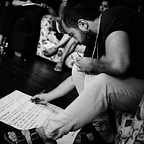Practices To Subtly Lift Your Group Up
When working with a group there are numerous micro practices that powerfully hand power back to the participants.
In every moment you can show the group that you are the expert and know best, or you can subtly remind them of their own intelligence and capacity.
When the group keeps talking about needing to get an ‘expert opinion’ or ‘do additional research’, remind them how much intelligence is in the room in that very moment and challenge them to dive into the topic at hand with their existing resources and tools.
Instead of: agreeing and stopping all progress because they don’t feel legitimate.
Why: people are constantly taught their expertise and thoughts are not valid or worthy; these sentences are indicative of a group being afraid of being in its power.
Cultivate interest in what the participants are sharing, because they shared it and not because you consider the ideas good or bad.
Instead of: giving positive affirmation to certain comments and a neutral or negative response to others.
Why: participants will see that your priority is that everyone engages fully, and that there is space for many kinds of ideas.
Let them sort the data.
When there is a mess of post-its, let them choose the categories.
Instead of: making the categories and organizing everything.
Why: this gives them true ownership of the process and what emerges.
Immeditately name a racist/ableist/sexist/homophobic/transphobic/ageist/xenophobic etc. behaviour or comment in a relaxed way that does not exclude the perpetrator.
To make this not be an attack, focus on the comment and not the person, or simply state a group norm that the comment or action violates. Counter-intuitively, the perpetrator can actually be thanked here as their comment has provided an opportunity for the nature of the space to be ultra explicit (if it wasn’t the case already).
Instead of: focusing on the perpetrator or ignoring the comment or action.
Why: participants will know from the beginning that you are holding a safer space and that you won’t be allowing microaggressions and oppressive dynamics in your collective container.
When writing a comment on a flipchart, use the participants’ exact language.
Instead of: paraphrasing or finding a more professional way of expressing their thought.
Why: you are showing them their words and their exact way of thinking matter.
When you see different activity options going forward, consider asking the group which one they think would be the most pertinent.
Instead of: steamrolling ahead and assuming you know what will best meet their needs.
Why: groups have a great understanding of what will be most helpful to them, they often just need to be asked.
Treat the group at the height of its intelligence.
Instead of: explaining concepts they already have a good grasp of.
Why: it’s infantilizing to be ‘taught’ something that is obvious or that the group already knows.
When they have a criticism of your process, ask them what they would propose as an alternative.
Instead of: taking it personally, getting defensive, or continuing on as though nothing had happened.
Why: the fire of criticism can generate powerful forward movement if the ball of responsibility is tossed back.
When they criticize your facilitation or you as a facilitator, inquire into what deeply held values are behind the critique. In other words, use the criticism to step into empathy and understanding.
Instead of: making the mistake of receiving the personal attack and feeling useless as a facilitator. You can take time after the meeting to consider the statement and process it as needed.
Why: in many ways, receiving a criticism can be a trap that brings you into an activated ego state.
Share a flow of the agenda when possible.
Instead of: keeping the agenda to yourself and denying participants the opportunity to modulate their energy and participation as needed.
Why: participants will know at what point they will be able to discuss and contribute fully which can be quite reassuring.
Allow multiple entry points for different levels of participation.
Someone is energetic and loves your activities ? Great. Someone is grumpy and has no energy? Great, let them join in a way that feels good to them.
Instead of: making it clear that only a certain kind of (often extroverted) participation is welcome.
Why: participants will feel they can show up more authentically and fully when they realize you aren’t subtly expecting them to be a certain way.
Share your own imperfections and quirks as they naturally arise.
Instead of: cultivating an image of a perfect godlike facilitator.
Why: participants will feel all the more comfortable knowing you are just a person holding space, not some separate and infinitely knowledgeable being. This involves being in situations of vulnerability in front of the group and yes, failing.
Bottom line: The next time an ambiguous situation arises, consider asking yourself what would be most in service of your group’s self-determination and empowerment.
